
Biblical Offerings
(How did they work?)
One of the most misunderstood topics in the scripture today is the sacrificial system, and specifically, the offerings explained in the book of Leviticus. Today we are so far removed from anything like it that to practice them would seem very foreign to us. It is my contention that a proper understanding of these sacrifices would lead many to believe that we should still do them today. In fact, in a way, we do practice them today. It is the intent of this article to identify the purpose of the offerings in the book of Leviticus and find the proper application for them today. I understand that there are many symbolic meanings that go along with these offerings, but the scope of this article is to stick with the literal and practical interpretations from the book of Leviticus. Before we can understand the meaning of the offerings we must first understand what the Tabernacle and Temple were for.
The Tabernacle/Temple:
The Tabernacle can be a confusing topic, but it shouldn't be. Many times we get confused by a difference in language. This difference in language causes us to see the Tabernacle as a religious institution rather than a legal institution. The bottom line is this, the Tabernacle was designed to enforce the Law of God. This makes the Tabernacle more like our modern courts today. In fact, the tabernacle was not only like our modern courts, but also like our modern hospitals and butchers as well. We simply do not make these connections because the Bible does not use these words. We need to remember, there was one main Tabernacle for the people of God, but there were several other locations where people could go to avail themselves of the Tabernacle services (Ex. 18:21-22). These locations are what the New Testament called Synagogues (Matt. 13:54, Luke 4:16, John 6:59) and were probably located in every city. This is just like our current Judicial System. We have the Supreme Court as our highest court and many, many Appellate Courts below it. Our current Judicial System comes from the Law of God. For more on this please see my video "The Sacrificial System."
The Tabernacle/Temple as a Judicial System:
The Temple was designed to enforce the law of God. The direct instrument used to do so was called the High Priest's Servant (2 Chron. 24:11, 1 Sam. 2:13, Matt. 26:51). This is what we would call the police today. The High Priest servant's job was to enforce the law of God and was at the direct disposal of the High Priest. If someone were found guilty of a crime/sin (1 John 3:4) they would be charged and have to appear before the Judges (Ex. 22:9). If the crime/sin permit so, they can be sent to ward/jail until their trial is completed (Num. 15:34). When trial starts all testimony will be heard at the mouth of two or three witnesses (Deut. 19:15). This was always before a jury (the congregation Num. 35:12, 24-25, Josh. 20:6, 9). This is what is meant when the scriptures use the phrase, "tabernacle of the congregation." This is a tabernacle of the people/jury to decide matters of judgment. The High Priest, Priest, or Judge oversees this trial by helping the congregation/jury to understand the law of God. Those on trial were permitted to have lawyers/intercessors to represent them. By the time of the Messiah they had become corrupt (Matt. 5:20, 16:6, 23:2-3, 13, Luke 11:39, 42). After the trial, if you were found guilty, you would receive a punishment such as fines (Ex. 21:22), restitution (Ex. 21:23-25), punitive damages (Ex. 22:21) and even the death penalty (Ex. 21:12). The Tabernacle/Temple no doubt represented what we would call a Judicial Court today.
The Tabernacle/Temple as a Hospital:
The Tabernacle/Temple also represented what we would call a hospital today. The Israelites were to bring their sick to the Tabernacle to be seen by the Priest (Lev. 13:2-3, 6). The Priest was to look upon the man with leprosy and keep watch over him. If he was determined to have leprosy he would be quarantined for the protection of the people (Deut. 23:10-11). Those who were sick were to seek natural remedies such as herbs (Psalm 51:7, Is. 38:21) and oils (James 5:14). If you study the scripture carefully concerning herbs and oils you will find that many of the herbs and oils mentioned have great healing properties. Here is a short list of some of these:
| Herbs | Oils |
|
|
The Tabernacle/Temple is God's design for our current hospitals. The problem today is we have corrupted God's design to heal our bodies. In fact, if you do your biblical research you will discover that the Greek word used for "witchcraft" and "sorcery" is pharmakeia (Gal 5:20) which means "medication, pharmacy" (Strong's Concordance - G5331). This is a word used to describe the prescription of drugs for healing purposes. God warned us not to use drugs for healing purposes, but we don't listen. If you think about it, a drug is designed to cover up a symptom, but not get rid of the problem. If you have a headache and take an aspirin it does not get rid of the headache, it only blocks the signal of pain to your brain so you don't feel the headache. Was it the lack of an aspirin that caused the headache? No. The headache is our bodies warning system to warn us of a problem. We are most likely missing a nutrient that our body needs, which is what is causing the head ache. We would be better off trying to discover what our body needs instead of taking a drug to get rid of the symptom. Our modern hospitals are what the scripture refers to as witchcraft.
The Tabernacle/Temple as our Butcher:
This might seem odd, but consider the following. There is a law in Leviticus that states, "What man soever there be of the house of Israel, that killeth an ox, or lamb, or goat, in the camp, or that killeth it out of the camp, And bringeth it not unto the door of the tabernacle of the congregation, to offer an offering unto the LORD before the tabernacle of the LORD; blood shall be imputed unto that man; he hath shed blood; and that man shall be cut off from among his people" (Lev. 17:3-4). An Israelite could not kill an animal to eat without first taking it to the Tabernacle to have the Priest kill it. This was most likely connected to other laws such as not eating fat or blood (Lev. 3:17). This required a specific type of killing to make sure that the blood was drained and the fat was trimmed. The fat was considered God's portion of the meal (Lev. 3:16) and the meat was for us to eat. If an Israelite wants to eat of the meat of one of their clean animals, they must offer this meat up in the Tabernacle first so God and the Levites can have their portion, then we can eat our portion.
The Offerings of Leviticus:
With all this in mind let's try to gain a better understanding of the Offerings of Leviticus. There are five offerings in the book of Leviticus. They can be split into two different categories: compulsory and voluntary. The compulsory offerings are the Burnt Offering, the Sin Offering, and the Trespass Offering. The voluntary offerings are the Meat or Meal Offering, and the Peace Offering. Another way of categorizing these are those that deal with sin and those that do not. Those that deal with sin are the Burnt Offering, the Sin Offering, and the Trespass Offering. Those that do not deal with sin are the Meat or Meal Offering and the Peace Offering. Here is a brief look at each one and its purpose.
The Burnt Offering:
The Burnt Offering is the most common offering of the scriptures. As such, it is to be offered every morning and evening (Ex. 29:38-39). An additional offering was to be offered each Sabbath (Num. 28:9-10), at the beginning of each month (Num. 28:11), and at many of the mandatory feasts (Num. 28:16, 27, 29:1, 6). This offering was continual and the smoke from this offering could be seen day and night (Num. 9:15-16). This offering was often offered with another offering such as the Sin Offering (Lev. 5:7, 6:25, 9:2-3, 7, 12:6, 8) and the Trespass Offering (Lev. 5:7, 10, 17-18). In fact, it was mandated to be offered every time an Israelite made a freewill offering (Lev. 22:18, 23:12, 18). The Burnt Offering was offered every time an Israelite entered the Tabernacle to use it's services.
This offering was always made on a voluntary basis (Lev. 1:3). It was done for various reasons, such as cleansing a woman after childbirth (Lev. 12:6-8), the cleansing of a leper (Lev. 14:19-20), and of a man with a bleeding issue in his skin (Lev. 15:14-15). This was a voluntary offering for personal sin. When an Israelite committed a sin that caused an illness or injury, which was the punishment for their sin (Ex. 15:26, Deut. 28:21-22, 27), this offering was to be made voluntarily. This is contrary to being caught of a sin and tried. This offering was voluntarily made as the sinner came to terms with his own sin.
This offering was also given for the nation as a whole. Sins can be committed on a national level as well (Lev. 4:13-14). This is why it was offered so often. The services of the Tabernacle were not open to the people until this offering was made each morning. The service of the Tabernacle did not end until this offering was made in the evening.
The Burnt Offering is a contract offering. This offering was always given to ratify a covenant such as with Noah (Gen. 8:20), with Abraham (Gen. 15:9, 18), and with Moses, (Ex. 24:5). Whenever a contract, or vow, was given, a burnt offering was to be given voluntarily for the ratification of that vow (Psalms 66:13-14). This can be likened to what we call notarization today. In ancient times a vow was confirmed (ratified) with a burnt offering.
This offering was also given whenever a contract term was enforced. For example, burnt offerings were required from a woman after childbirth (Lev. 12:6), when men has a running issue (Lev. 15:14-15), for the cleansing of a leper (Lev. 14:19-20), and when defiled by a dead body (Num. 6:11, 14). These are all examples of natural consequences of breaking a contract/covenant. Child birth is a curse of the Adamic Covenant. Running issues are usually the result of breaking the commandments of God. Leprosy is a curse for breaking the Mosaic Covenant. And death is a result of sin, which is breaking Covenant with God. When we receive a natural consequence of breaking a covenant we owe a burnt offering. These were always voluntary.
Whenever someone wanted to ratify a new contract or covenant they would have to offer a Burnt Offering. “Speak unto Aaron, and to his sons, and unto all the children of Israel, and say unto them, Whatsoever he be of the house of Israel, or of the strangers in Israel, that will offer his oblation for all his vows, and for all his freewill offerings, which they will offer unto YHVH for a burnt offering; Ye shall offer at your own will a male without blemish, of the beeves, of the sheep, or of the goats” (Lev. 22:18-19). To perform a vow or a freewill offering you must “offer unto YHVH for a burnt offering.” This initiates the contract or covenant. When the contract is fulfilled and the vow is paid a Peace Offering is offered. “And whosoever offers a sacrifice of peace offerings unto YHVH to accomplish his vow, or a freewill offering in beeves or sheep, it shall be perfect to be accepted; there shall be no blemish therein” (Lev. 22:21). A vow is a loan and is ratified with a Burnt Offering. When the vow is paid in full it is accomplished with a Peace Offering. This makes sense for the Peace Offering was for a meal. This is a celebratory meal for paying off the debt. Here are the specifics of the Burnt Offering.
|
The Burnt Offering |
|
| All |
|
The Sin Offering:
The Sin Offering is categorized as a compulsory offering. It is an offering for sin. However, where the Burnt Offering is for sin in general, the Sin Offering is for a specific sin committed in ignorance (Lev. 4:2-3). There is a distinction between what to offer based upon one's status in Israel. A Priest must offer a bull without blemish, the whole congregation must offer a bull without blemish, a ruler must offer a kid of the goats or sheep without blemish (male or female), and a commoner must offer a kid of the goats or sheep without blemish (male or female). There are some exceptions for the commoners who are poor. They can substitute two turtle doves or two pigeons if necessary, or even a 10th part of an ephah of fine flower. This is a statute to protect the poor and needy.
To understand the purpose of this offering we need to keep in mind some of the specifics. First, this was an offering for a specific sin and only if you "are guilty" (Lev. 4:13, 22, 27). The question to ask is, how do we know if someone is guilty? In Deuteronomy 19:15 we learn that, "at the mouth of two witnesses, or at the mouth of three witnesses, shall the matter be established." To be found "guilty" they must first be brought to trial with witnesses, and this trial must be before the congregation/jury (Num. 35:12, 24-25). If found guilty, they will then be sentenced to pay their sacrifice/offering. Today we would call this a fine and the court costs were the portion paid to the Priest for his work (Lev. 6:26). This is another example of how the Tabernacle is like our current Judicial System. When we commit a crime/sin today, we are sent to court/tabernacle to atone/pay for our crime/sin. This offering is what we would call a fine today.
|
The Sin Offering |
|
| Priest |
|
| Congregation |
|
| Ruler |
|
| Commoner |
|
| All |
|
The Trespass Offering:
The Trespass Offering is another compulsory offering. This offering is mandated for all sins that cause a damage (Lev. 5:16). This means that the individual has committed a sin in ignorance (Lev. 5:15) or intentionally (Lev. 6:2-3) and has caused damage to another individual. The offering is made plus restitution for the damage, including punitive damages (Lev. 5:16). One fifth is also paid to the priests as an extra payment for punitive measures. The "estimation by shekels of silver" are paid to the damaged party for punitive measures as well.
We learn from Exodus 22 what to do in specific cases. For example, in matters of theft he is to pay double if the property is returned (Ex. 22:4) to the original owner. If the property is not returned, he is to pay four times for misdemeanor theft and five times for felony theft (Ex. 22:1). This can be paid in real property like sheep or ox (Ex. 22:1) or it can be measured by shekels of silver (Lev. 5:15, 6:6). This is the law concerning punitive damages.
This is another example of how the Tabernacle is like our current Judicial System. When we commit a crime/sin today, we are sent to court/tabernacle to atone/pay for our crime/sin. This offering is what we would call a fine today. The punitive damages paid for by two times, four times, or five times is similar to our punitive damages today.
|
The Trespass Offering |
|
| All |
|
The Peace Offering:
The Peace Offering is a confusing title for this sacrifice. It would probably be better called the Meat Offering, for this was an offering to be able to eat of your animals. We know from Lev. 17:3-4 that an Israelite can not kill of their animals without bringing it first through the door of the local Tabernacle. In fact, the penalty for killing an animal apart from the Tabernacle was excommunication (Lev. 17:4). The way for an Israelite to eat meat was to offer the Peace Offering (Lev. 17:5). If you think about it, it makes sense. The Levites did not have time to keep their own animals for meat. They were required to attend at the Tabernacle and they were to eat of the offerings of the LORD (Lev. 18:1). The way for them to get meat was to be able to eat of the people's animals. To ensure that they would get their portion, God forbid the Israelites from killing their animals themselves (Lev. 17:3-4).
This is how the Tabernacle is like our modern day butcher. The Levites knew how to correctly butcher an animal to make sure the meat was fit to eat. This is why the chapter which contains the Peace Offering ends with, "It shall be a perpetual statute for your generations throughout all your dwellings, that ye eat neither fat nor blood" (Lev. 3:17). This offering was designed for us to be able eat clean meat correctly. Since we were not allowed to eat fat or blood, the animal was taken to the Tabernacle to be killed in a manner to keep us from eating fat or blood. The animals neck was cut and the blood drained (Lev. 3:2, 8). All the fat was removed (Lev. 3:4) including the rump (Lev. 3:9). The rump is the meat near the back end of the animal. This meat is considered of lesser quality today. Perhaps this is why it is burned rather than eaten. Another possibility is the chance of toxins due to its location near the bowels. Either way, the rump portion of the meat was not to be eaten.
|
The Peace Offering |
|
| All |
|
The Meal (Meat) Offering:
The Meal Offering is similar to the Peace Offering, except for grains. We are to offer an offering to the LORD of both our animals and our crops. The animals are given in a Peace Offering and the crops are given in a Meal Offering. Israelites are required to give of their first fruits as a means of sharing their portions with God and the Levites. To start off the year this is done through the Feast of Passover, Unleavened Bread, and First fruits. During this feast the Israelites would offer the first fruits of their crops (Lev. 23:10, 17). This was a feast to celebrate the start of the harvest season. This season would last for months and the Meal Offering would be given throughout this season as different harvests were reaped. The Israelites were to give of the first fruits of all their animals and crops (Deut. 18:1-4). This would provide the food and products necessary for the Levites to live and was to compensate them for their service in the Tabernacle. When an Israelite harvested of their crops they were to give their first fruits to the Tabernacle to share with the LORD and the Levites. This was a meal provided for the LORD, the Levites, and the Offeror.
|
The Meal (Meat) Offering |
|
| All |
|
With all this said, I believe we should still practice these offerings today. Our Temples, what we call Judicial Courts today, should require just weights and measures to make these payments just as the scriptures require (Deut. 25:15, Prov. 11:1, 16:11). We should have to make these offerings/payments in property like wheat, honey, beans, corn, oxen, sheep, bulls, gold, or silver. This was God's plan. Making payments in unjust weights and measures like Federal Reserve Notes, checks, and credit cards is against God's law and should not be tolerated. It is too easy to simply write a check to pay the damages we have caused, especially when money is no object. However, killing an animal and offering it before the LORD is a very difficult and dirty job. All it takes is to have to do this once and you will most likely be deterred from breaking that law in the future. The truth is we do this sacrificial system today, we just do it incorrectly. Just look at the following pictures and see for yourself.
Below is the
Tabernacle layout. In the center is the
Tabernacle and surrounding the tabernacle are all
the tents and homes of Israel. All city
business took place at the tabernacle.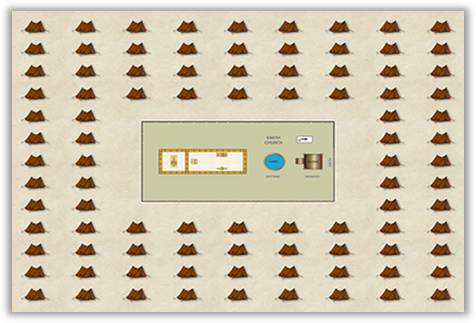 Take a look at a more modern city. The courthouse is in the center and all the homes surround the courthouse. God was giving us a plan for how to build our cities. 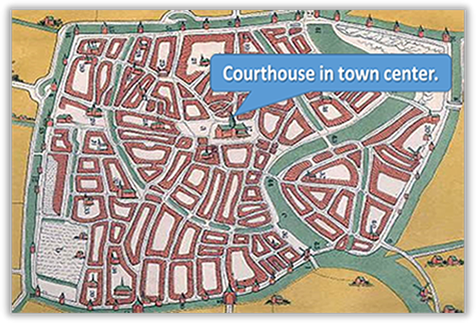  Now take a look at the outside of the Temple. The Temple had two pillars on the front. Court trials took place in the holy place where the priests wear the breastplate of judgment (Ex. 28:29). There were chambers to the side for court business to take place. 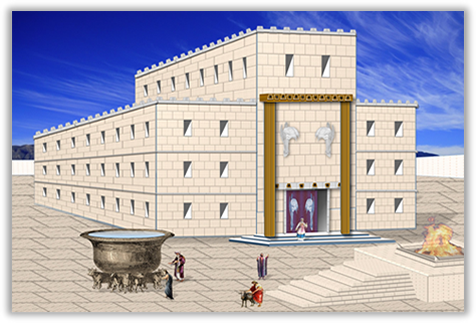 This Temple is the precursor to our Supreme Court. It was the judicial system of ancient Israel. Below is our Supreme Court. Do you see any similarities? There are pillars across the front, judges chambers on the side, and trials take place in the courtroom. 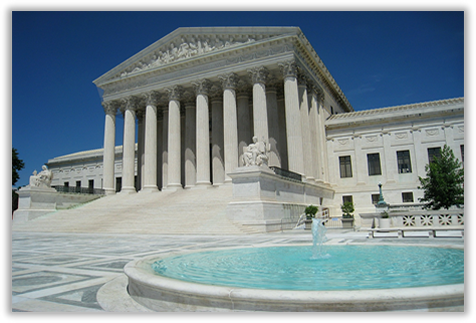  Now lets look at the inside of the Temple. There are two veils. One at the front of the Holy Place and one between the Holy Place and the Holy of Holies. 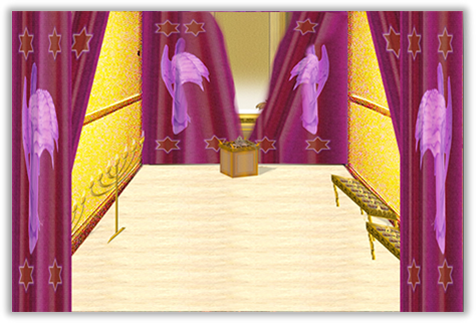 Below is the inside of our Supreme Court. Do you see any similarities? The Supreme Court has two veils as well. 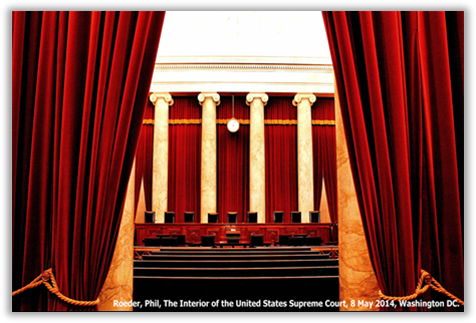  Here is an ancient synagogue, which was the place of judgment in Israel during the Messiah's life. This was the lower court system. 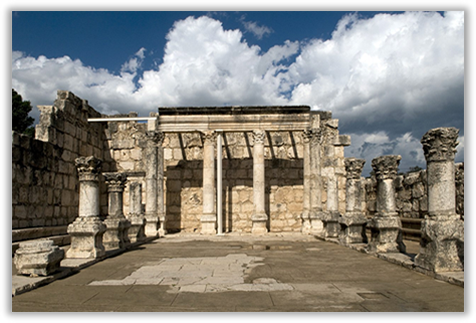 Below is a picture of the American Lower Court system. Do you see any resemblance?   Here is a picture of the brazen altar at the temple. This is where the fines/sacrifices were paid. Payment was always made in real property like wheat, honey, corn, lambs, goats, etc. 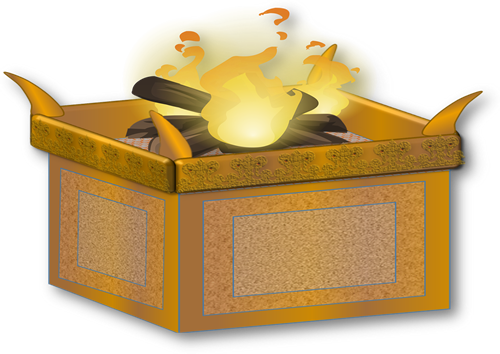 Here is a picture of the altar of earth. This altar was at the gates of every city. This is the lower court altar where fines/sacrifices were paid. Our court systems no longer have altars because we have traded real property for paper money. 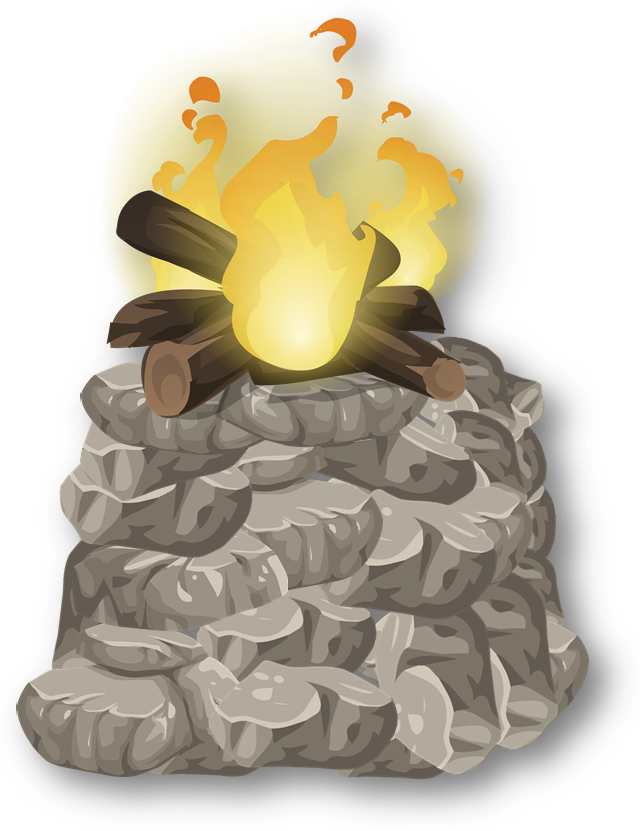 |
||
| This video will help explain more. | ||
The confusion of the Tabernacle comes from our lack of understanding of how it works. Most believe that the Tabernacle/Temple was simply a place of teaching. This is definitely true for the Messiah Himself taught often on the Sabbath in many synagogues (Matt. 13:54, Luke 4:16, John 6:59), but there is more to the Tabernacle than just education. The best comparison is that of our modern Judicial System with all of it's courts. This, however, would be an over simplification, for it can also be compared to our hospitals and our butchers. God had a plan for how we are to treat disease and properly kill our animals for food. We should still follow this example today. In fact, in many ways we still do, although we have corrupted it in our modern times. Instead of having to kill an animal to pay for our crimes/sins, we simply write a check for our fine/sacrifice. Maybe if we did have to kill an animal as Leviticus prescribes, it would help to deter us from further crimes/sins. I doubt we will ever go back to utilizing a Tabernacle/Temple the way God intended. The Tabernacle was intended to enforce God's law for a rebellious people. Since we still rebel against God today, shouldn't we still utilize His means to deal with this rebellion. After all, "the law is not made for a righteous man, but for the lawless and disobedient" (1 Tim. 1:9). If we were practicing the Tabernacle today, those who do not break God's law would have little use for it. For more on how the Sacrificial System works please see my video The Sacrificial System.
By Steve Siefken
Study to shew thyself approved unto God, a workman that needeth
not to be ashamed, rightly dividing the word of truth.
2 Timothy 2:15 KJV